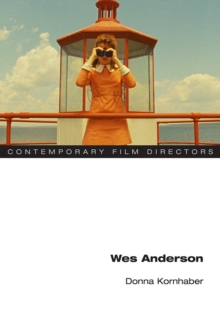Description
| Product ID: | 9780252082726 |
| Product Form: | Paperback / softback |
| Country of Manufacture: | US |
| Title: | Wes Anderson |
| Authors: | Author: Donna Kornhaber |
| Page Count: | 194 |
| Subjects: | Film history, theory or criticism, Film theory & criticism, Individual film directors, film-makers, Filmmaking and production: technical and background skills, Biography: arts and entertainment, Individual film directors, film-makers, Film production: technical & background skills, Biography: arts & entertainment |
| Description: | Select Guide Rating The Grand Budapest Hotel and Moonrise Kingdom have made Wes Anderson a prestige force. Rushmore and The Royal Tenenbaums have become quotable cult classics. Yet every new Anderson release brings out droves of critics eager to charge him with stylistic excess and self-indulgent eclecticism.Donna Kornhaber approaches Anderson's style as the necessary product of the narrative and thematic concerns that define his body of work. Using Anderson's focus on collecting, Kornhaber situates the director as the curator of his filmic worlds, a prime mover who artfully and conscientiously arranges diverse components into cohesive collections and taxonomies. Anderson peoples each mise-en-scéne in his ongoing ""Wesworld"" with characters orphaned, lost, and out of place amidst a riot of handmade clutter and relics. Within, they seek a wholeness and collective identity they manifestly lack, with their pain expressed via an ordered emotional palette that, despite being muted, cries out for attention. As Kornhaber shows, Anderson's films offer nothing less than a fascinating study in the sensation of belonging--told by characters who possess it the least. The Grand Budapest Hotel and Moonrise Kingdom have made Wes Anderson a prestige force. Rushmore and The Royal Tenenbaums have become quotable cult classics. Yet every new Anderson release brings out droves of critics eager to charge him with stylistic excess and self-indulgent eclecticism. Donna Kornhaber approaches Anderson''s style as the necessary product of the narrative and thematic concerns that define his body of work. Using Anderson''s focus on collecting, Kornhaber situates the director as the curator of his filmic worlds, a prime mover who artfully and conscientiously arranges diverse components into cohesive collections and taxonomies. Anderson peoples each mise-en-scéne in his ongoing ""Wesworld"" with characters orphaned, lost, and out of place amidst a riot of handmade clutter and relics. Within, they seek a wholeness and collective identity they manifestly lack, with their pain expressed via an ordered emotional palette that, despite being muted, cries out for attention. As Kornhaber shows, Anderson''s films offer nothing less than a fascinating study in the sensation of belonging--told by characters who possess it the least. |
| Imprint Name: | University of Illinois Press |
| Publisher Name: | University of Illinois Press |
| Country of Publication: | GB |
| Publishing Date: | 2017-08-16 |


